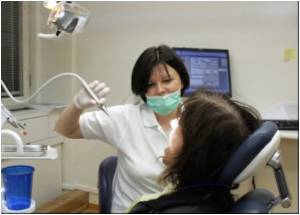India passed a law in 1948 allowing only licensed dentists to treat patients, but street dentists in smaller towns perform root canals and other operations.

"There are millions of poor people in this country who cannot pay for expensive dental treatment, they also have a right to be treated and look good. I know this is not hygienic at all but if I start using sophisticated tools, the poor man won’t come here,” said Baksh.
From dentists to shoe shiners, barbers and chefs, street services are an engrained part of life in India, particularly for the poor.
80 Cents a Tooth
Baksh never formally trained as a dentist, instead learning his skills from his father, who came in 1984 to the southern, sleepy backwater now transformed into a regional IT hub and thriving metropolis. Alongside his younger brother, son and nephew, Baksh set up their clinic 14 years ago outside a bus stand, where together they make and fit dentures for some 20 customers a day.
A full set of teeth, molded and ready to fit in 30 minutes, costs as little as Rs. 800 ($12), while a single false tooth sells for Rs. 50 (80 cents). Tools are thoroughly washed in soap and water but not disinfected. The teeth in all shapes and sizes are made in China and in India from dental cement. Soft pink adhesive is then moulded for gums and the teeth stuck in, with the dentists saying their handiwork lasts for at least four years.
In big cities such as New Delhi and Mumbai, street dentist numbers have dwindled in recent years on growing awareness of contracting HIV/AIDS and other diseases, rising customer income levels, and a surge in dentist graduates. But they still thrive in smaller cities as well as towns, although few perform root canals, fillings or other operations.
Dhoble said 30,000 graduates join the profession every year, but India still has only one dentist per 10,000 people in urban areas and about 250,000 in rural areas, according to the US National Library of Medicine. Dhoble branded unlicensed dentists quacks who were not worth the risk, despite a lack of ultra cheap services offered by licensed professionals for the poor.
"Ban them and they will be forced to look for another job. We can’t have cheap treatment as an excuse to continue this practice," he said.
Status Symbol
Dentist Satvinder Singh, 48, said his profession is slowly dying because of the growth of India’s formal dentist industry along with more hygiene-conscious customers.
"A few decades ago I used to get 30 customers a day. I hardly see two now," said Singh.
Singh said a few decades ago, traders from a nearby spice market, Asia’s largest, would line up for his false silver and gold teeth, considered a status symbol. "Earlier rich and poor would equally visit us but now we are looked down on," he said.
For his part, Baksh remains adamant he is improving the lives of the poor, and that his family will continue the tradition. "We have thousands of satisfied customers, who not only pay us but give us their blessings."
Source-AFP
 MEDINDIA
MEDINDIA


 Email
Email






